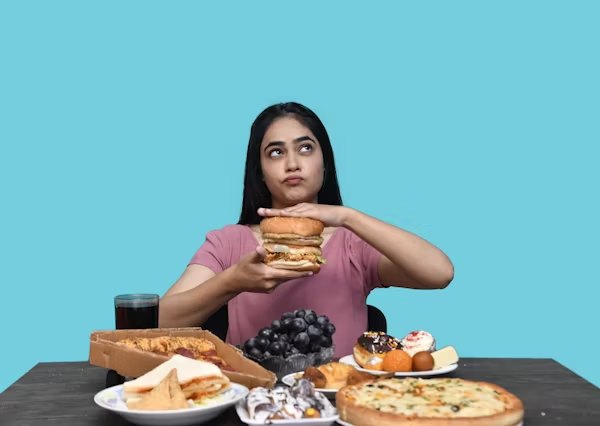Physical Address
304 North Cardinal St.
Dorchester Center, MA 02124
Physical Address
304 North Cardinal St.
Dorchester Center, MA 02124

Home of all Learning...

Home of all Learning...


For most of my adult life, I was a night snacker. You know the drill—Netflix on, the house quiet, and a slice of cake or bowl of cereal whispering from the kitchen like a toxic ex. It felt harmless. After all, I ate “healthy” during the day. But something changed the night I stepped on the scale and realized I hadn’t lost a single pound despite eating clean and working out five days a week.
That’s when I decided to test one theory I saw floating around on Reddit, YouTube, and even overheard at the gym: Stop eating at night to lose weight. More specifically, I committed to no food after 6:30PM for 21 days—no matter what.
Here’s what happened.
The first few nights felt like war. Not with food, but with my brain.
Around 9PM, I’d wander into the kitchen automatically, half-expecting to grab “just a handful of nuts.” But I’d stop, remember the new rule, and pour a glass of water instead. It wasn’t hunger—it was habit. My body had gotten used to that sugar hit before bed.
Out of curiosity, I started tracking how often I craved snacks at night and what triggered it. Unsurprisingly, it was usually boredom, stress, or scrolling social media. That alone was a huge realization.
I stumbled on a few “stop late night snacking Reddit” threads and saw I wasn’t alone. People everywhere were trying to break this loop.
By the second week, something strange happened: I started waking up earlier, with more energy. Not buzzing like a superhero, but refreshed.
One night, I dreamed I was eating a donut at midnight and woke up feeling guilty, only to realize it never happened. Even my subconscious missed snacking.
I started noticing fewer digestive issues. I wasn’t waking up bloated or sluggish. My skin even looked clearer, though I wasn’t sure if it was from the new habit or my increased water intake.
I also wrote this quote in my journal (I found it on Pinterest):
“Cravings are just false alarms. You don’t need to answer every one.”
That quote became my personal motto.

I won’t lie. There were nights I wanted to grab anything—nuts, dark chocolate, toast. But I learned tricks that helped:
Brushed my teeth after dinner. Mint kills cravings.
Made herbal tea my “late snack.” Chamomile and peppermint became comforting.
Created a go-to list of “Late night cravings ideas” that weren’t food: journaling, taking a bath, stretching, even texting a friend.
Planned dinner better. A balanced dinner with protein, healthy fat, and carbs helped me feel full longer.
Related – The Trick That Finally Helped Me Stop Midnight Snacking — No Fad Diet, Just Psychology
By Day 18, it didn’t feel like a challenge anymore. It just felt… normal.
I started noticing my waistline slim down slightly—not dramatic, but enough that my jeans fit better. My face looked less puffy. Even my mood during the day felt more stable. Turns out, not stuffing my stomach before sleep gave my body time to recover.
Also, I stopped waking up ravenous. It was like my body had finally found its rhythm.
I read somewhere that “how to stop snacking after dinner” isn’t just about willpower—it’s about circadian rhythm alignment. Eating late confuses your internal clock, making your body hold onto fat longer and disrupting sleep quality.
Yes. But more importantly, I lost the attachment to food as an emotional crutch after sunset.
After 21 days:
I lost 5 pounds
My energy increased
I started sleeping deeper
My late-night cravings disappeared almost completely
My relationship with food became intentional, not impulsive
And no, I didn’t follow any strict diet. I just stopped eating after 6:30PM.
I didn’t want this to just be anecdotal. So I did some digging.
According to a study published in the Journal of Clinical Endocrinology, eating late at night increases blood sugar spikes, fat storage, and throws off hormones like melatonin and cortisol.
Also, in many “3-month transformations” I read about, people always mentioned controlling night cravings as a breakthrough moment.
It made sense now.
I’m not obsessed with the clock anymore, but I’ve kept my “cut-off time” at 6:30PM. I treat it like brushing my teeth—non-negotiable.
I now plan social dinners earlier, or simply fast after dinner when I know I’ve eaten enough. It’s surprisingly freeing.
If you’re reading this and feel like you can’t stop snacking at night, I feel you. But trust me: the first few days are the hardest. After that, your body adjusts. And when it does, it rewards you with better sleep, better focus, and subtle but powerful changes in your health.
Give yourself 21 days. Just commit.
Your body doesn’t need that midnight toast—your brain just misses the ritual.
Break the cycle. You won’t regret it.